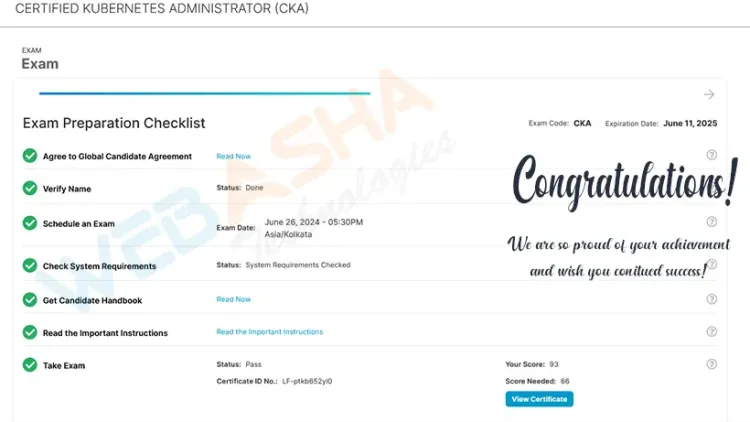How to Pass CKA Global Certification Exam in 1st Attempt [2025]
Learn how to pass the Certified Kubernetes Administrator (CKA) Global Certification Exam on your first attempt with our comprehensive guide. Discover effective study strategies, essential resources, hands-on practice tips, and expert advice to ensure your success. CKA Dumps
![How to Pass CKA Global Certification Exam in 1st Attempt [2025]](https://www.webasha.com/blog/uploads/images/202406/image_750x_667e932748405.webp)
Passing the Certified Kubernetes Administrator (CKA) Global Certification Exam involves a combination of proper study materials, hands-on practice, and guidance from experienced professionals. Here's how Ankit Lakhe might have achieved this with the help of WebAsha Technologies:
-
Structured Learning Path: WebAsha Technologies likely provided a well-structured learning path, including a detailed syllabus covering all the domains tested in the CKA exam, such as Kubernetes architecture, installation, configuration, workload management, networking, and troubleshooting.
-
Experienced Instructors: Ankit might have benefited from the experience of seasoned instructors at WebAsha Technologies. These instructors would provide insights, tips, and best practices for understanding complex Kubernetes concepts and successfully navigating the exam environment.
-
Hands-on Labs: Practical, hands-on experience is crucial for the CKA exam. WebAsha Technologies probably offered extensive lab exercises and real-world scenarios to help Ankit gain the necessary practical skills. These labs would simulate the types of tasks he would need to perform during the actual exam.
-
Study Materials and Resources: Comprehensive study materials, including video lectures, reading materials, and practice questions, would be provided by WebAsha Technologies. These resources would help Ankit thoroughly understand the topics and reinforce his learning.
-
Mock Exams and Practice Tests: To prepare for the CKA exam's format and time constraints, Ankit likely took advantage of mock exams and practice tests offered by WebAsha Technologies. These practice exams would help him get familiar with the exam interface and manage his time effectively.
-
Doubt Clearing Sessions: Ankit might have participated in doubt clearing sessions or discussion forums facilitated by WebAsha Technologies, where he could ask questions and get clarifications on any topics he found challenging.
-
Exam Strategies and Tips: Guidance on exam strategies, such as time management, prioritizing tasks, and handling tricky questions, would be an essential part of WebAsha Technologies' training program. This would help Ankit approach the exam with confidence and efficiency.

By following this comprehensive training approach with WebAsha Technologies, Ankit Lakhe would have been well-prepared to pass the CKA Global Certification Exam and earn his certification.
CKA Exam Preparation Step By Step
Preparing for the Certified Kubernetes Administrator (CKA) exam requires a systematic approach to ensure a thorough understanding of Kubernetes concepts and hands-on experience. Here’s a step-by-step guide to help you prepare effectively:
Step 1: Understand the Exam Blueprint
-
Review the Official Exam Curriculum: Familiarize yourself with the domains and topics covered in the CKA exam. The main areas include:
- Cluster Architecture, Installation & Configuration
- Workloads & Scheduling
- Services & Networking
- Storage
- Troubleshooting
-
Exam Format: Understand the format of the exam, which is performance-based and requires solving tasks in a command-line environment.
Step 2: Set Up Your Learning Environment
-
Install Kubernetes: Set up a local Kubernetes cluster using tools like Minikube or Kind. Alternatively, use cloud providers like GKE, EKS, or AKS for a more realistic environment.
-
Access to a Linux Environment: Since the exam involves working in a Linux command-line interface, ensure you are comfortable with basic Linux commands and tools.
Step 3: Study Resources
-
Official Documentation: The Kubernetes official documentation is the primary source of truth. Get comfortable navigating and finding information quickly.
-
Online Courses: Enroll in reputable online courses that cover the CKA curriculum. Some popular options include:
- WebAsha Technologies
-
Books: Consider reading books like "Kubernetes Up & Running" by Kelsey Hightower, Brendan Burns, and Joe Beda.
Step 4: Hands-On Practice
-
Labs and Exercises: Regularly practice hands-on labs and exercises. Websites like Katacoda offer interactive Kubernetes scenarios.
-
GitHub Repositories: Use repositories like kubernetes-the-hard-way by Kelsey Hightower for deeper understanding and practice.
-
Mock Exams: Take mock exams to simulate the real exam environment. This will help you manage your time and improve your problem-solving speed.
Step 5: Join the Community
-
Forums and Discussion Groups: Participate in forums such as WebAsha, and other community groups to discuss doubts and learn from others’ experiences.
-
Webinars and Meetups: Attend Kubernetes webinars, meetups, and conferences to stay updated with the latest trends and network with other professionals.
Step 6: Focus on Key Areas
-
Core Concepts: Ensure you have a strong understanding of core Kubernetes concepts such as pods, deployments, services, and persistent storage.
-
Networking: Pay special attention to Kubernetes networking, including services, network policies, and DNS.
-
Security: Understand security aspects like RBAC, network policies, and secrets management.
-
Troubleshooting: Practice troubleshooting techniques extensively as this is a significant part of the exam.
Step 7: Exam Day Preparation
-
Time Management: During the exam, manage your time effectively. Start with easier questions to secure quick points and return to more challenging tasks later.
-
Documentation Usage: You can use the official Kubernetes documentation during the exam. Practice finding information quickly to save time.
-
Relax and Stay Focused: Ensure you are well-rested before the exam. Stay calm and focused during the exam to think clearly and solve tasks efficiently.
By following these steps, you will be well-prepared to tackle the CKA exam with confidence and earn your certification. Good luck!






![10 Tips to Ace the RHCE EX294 Exam in 1st Attempt [ Complete 2025 Guide ]](https://s3.ap-south-1.amazonaws.com/webasha-blog/uploads/images/202505/image_650x434_6825f22147a28.webp)

![RHCE EX294 Certification Cost in India [2025 Updated] | Fees, Training, Salary & Voucher Details](https://s3.ap-south-1.amazonaws.com/webasha-blog/uploads/images/202505/image_650x434_68203ff251840.webp)


![Top 10 Ethical Hackers in the World [2025]](https://www.webasha.com/blog/uploads/images/202408/image_100x75_66c2f983c207b.webp)



![[2025] Top 100+ VAPT Interview Questions and Answers](https://www.webasha.com/blog/uploads/images/image_100x75_6512b1e4b64f7.jpg)







